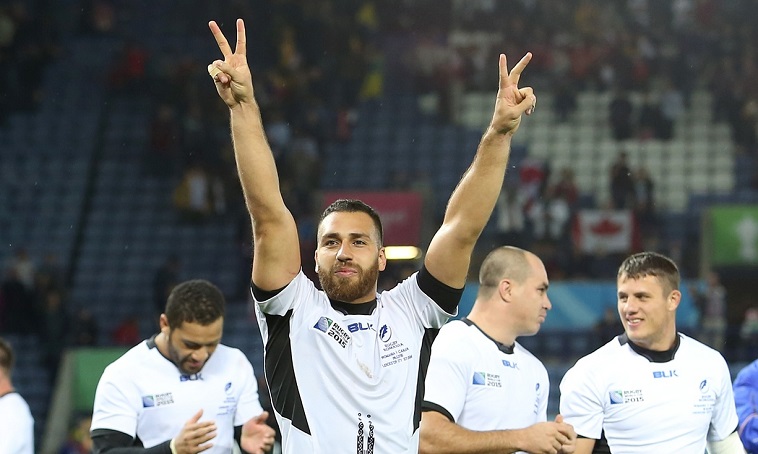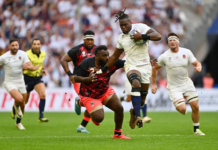Romania winning a game and Uruguay scoring a try prove that there is much more to the tournament than England’s catastrophic failure to progress from their pool – but lesser lights deserve more attention between World Cups.
The despair of England going out of the World Cup was followed by the jubilation in victory of Romania, who were already out, and the delight of Uruguay at scoring a try. One of the beauties of the tournament is that it is not about the host nation being on tour but all the 20 teams that make it an experience to be celebrated in the full every four years.
Uruguay may be doomed to finish at the bottom of their group, without a point after three matches and England in Manchester to come, but their tournament has been a relative success. A squad made up largely of amateurs have suffered three heavy defeats, but they have not capitulated and in two of their three matches, against Wales and Fiji, they conceded fewer points in the second half than they did in the first, and there was only a three-point difference against Australia.
They have not collapsed and neither have Namibia, who last week took part in an enjoyable frolic against Tonga in Exeter when they finished one try away from two bonus points and played their part in a full-on contest against Georgia on Wednesday night, gaining their first point in a World Cup and richly deserving it. If they and Uruguay have no more chance of defeating a major nation than they had in previous World Cups, and if they need to be given a profile in between tournaments to make a 20-country competition justifiable on rugby as well as financial grounds, the investment made by World Rugby in the form of paid coaches for developing nations and assistance for training programmes has made a notable difference.
Uruguay had shape in defence in their opening game against Wales and maintained it throughout. They kept tackling when they took on Australia and Fiji, outclassed but not outgunned. Their fitness was impressive and if they struggled, as expected, in some of the technical areas, such as the scrum, they have savoured every moment, unlike some for whom the pressure became too much.
To watch Georgia against New Zealand in Cardiff last week was a reminder of what the World Cup, at the pool stage at least, should be about. It was the first meeting between the sides: the All Blacks, the holders and the No1 ranked team in the world, were up against a side whose contact with tier one nations has been minimal – they played Ireland last November – and whose ambitions were very different.
Georgia rested their first-choice pack for New Zealand, with one notable exception, before the meeting with Namibia at Sandy Park when victory all but ensured that they qualified automatically for the 2019 tournament. Their captain and inspiration, Mamuka Gorgodze, did play against the All Blacks, and how. He was given a standing ovation when he was substituted in the second half and received an even louder cheer when he was named man of the match. He settled them down with a try against Namibia whose No8, Renaldo Bothma, stood out with him at Sandy Park.
A problem for the likes of Georgia, Namibia and Uruguay is that they appear in World Cups and are then forgotten about for another four years. A few hours after their performance against the All Blacks, when even the likes of Dan Carter were hustled into mistakes by the harrying and hassling Georgians who put the New Zealand scrum under severe strain, a petition was launched to put pressure on World Rugby to help Georgia break into the Six Nations.
It is unlikely to make any impact, not least because World Rugby is made up of member unions and run by an executive committee largely made up of representatives from the tier one nations who have an in-built majority when it comes to voting. The Six Nations, while not quite the gentleman’s club of old, runs itself.
All World Rugby have been able to do is underpin the Six Nations with the European Nations Cup, a tournament split into seven divisions that operates on a two-year cycle with teams playing each other home and away. It involves 37 countries and Georgia, who lead the top fight at the halfway stage in the current campaign having won five matches from five, are frustrated that if they outgrow the competition they have nowhere to go. They do not look ready for the Six Nations just yet, but for the first time in four World Cups they had something about them behind and the development of the game there should be actively encouraged by the big unions in Europe, not seen as a threat.
Any decision made by the Six Nations committee will be made on a commercial rather than a rugby basis. Their role is to maximise revenue from the tournament not grow the game on the continent, which was fine in the 100+ years when the eight foundation unions were markedly better than the rest. But the way it is administered is largely a relic of the amateur era which stifles ambition.
World Rugby lacks executive authority and will not be able to bring about fundamental change as long as voting power remains in the hands of the few. Attention has been lavished this week on England, the first hosts to be ejected from their own party before it has got into full swing, but a few thoughts should be spared for Fiji who, in another pool, would have had a chance of making the quarter-finals. Instead, they have to pre-qualify for the 2019 tournament.
A World Cup should reflect the contrasting ambitions of the various teams taking part. For some, winning it is the only thing; for others, making the last four represents achievement. There are those set on qualifying for the next tournament by finishing third in their group, while success for a few is measured in a single victory, a chance denied Uruguay because of the pool they found themselves in.
Japan provided the first major story of the World Cup when they defeated South Africa, a shock among shocks, and they could make history again this weekend by becoming the first team to win three group matches but fail to reach the knock-out stage. Playing Scotland five days after defeating the Springboks proved too much for them, but at least short turnarounds have been shared between big and small far more fairly than in 2011.
If the major unions do not respond to the groundswell beneath them, rugby may face a spring rising. They should take the opportunity to expand the game rather than hold on to what they have otherwise, like most autocracies, they will find themselves overtaken by events.






















